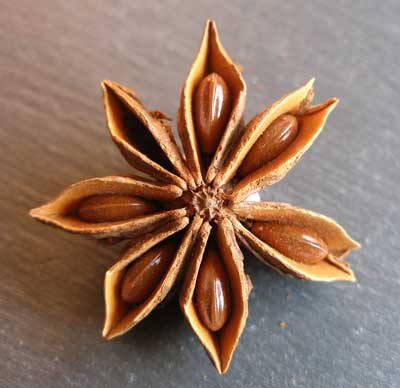"White wood ear." Silver ear fungus. A translucent white jelly fungus that grows on trees, used in Chinese cuisine.

is spice derived from the star-shaped pericarp fruit of a small tropical evergreen tree of the magnolia family, native to Vietnam and southwest China. Known variously as badiam, star anise/aniseed, and Chinese star anise, it is highly aromatic and tastes very similar to, but stronger than anise and liquorice, though it is not related. Hence, it is often a cheaper option and replacement for anise in baked goods. Star anise is also used in Sambuca, pastis, and many absinthes. Star anise is a component spice in Chinese 5-spice blend, in biryani, masala chai and garam masala, and in Vietnamese noodle soup, phở. Oil from Chinese star anise is used in cooking, as well as in perfumes, oral hygiene products, moisturizers, and in incense and candles. It is used in tradition Chinese medicine as an expectorant and contains the chemical compound, shikimic acid from which oseltamivir is derived, a drug used to treat flu symptoms.